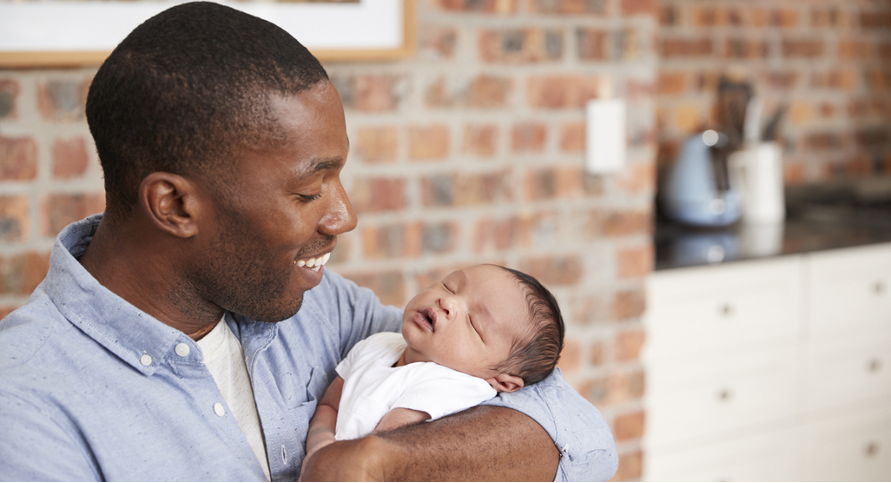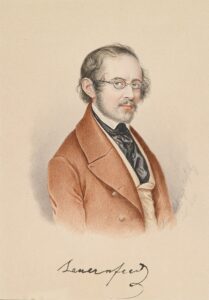The father with his child
(Poet's title: Der Vater mit dem Kind)
Set by Schubert:
D 906
[January 1827]
Dem Vater liegt das Kind im Arm,
Es ruht so wohl, es ruht so warm,
Es lächelt süß: Lieb Vater mein –
Und mit dem Lächeln schläft es ein.
Der Vater beugt sich, atmet kaum,
Und lauscht auf seines Kindes Traum;
Er denkt an die entschwundne Zeit
Mit wehmutvoller Seligkeit.
Und eine Trän aus Herzensgrund
Fällt ihm auf seines Kindes Mund –
Schnell küsst er ihm die Träne ab
Und wiegt es leise auf und ab.
Um einer ganzen Welt Gewinn
Gäb er das Herzenskind nicht hin! –
Du Seliger schon in der Welt,
Der so sein Glück in Armen hält!
The child is lying in its father’s arms,
Resting so contentedly, resting so warm,
The child smiles sweetly: “My dear father!”
And with a smile falls asleep.
The father leans over, barely breathes,
And listens to his child’s dream;
He thinks about the time that is now long gone
With a melancholy happiness.
And from the depths of his heart a tear
Falls onto his child’s mouth;
He quickly kisses the tear away
And rocks the child up and down.
In order to gain the whole world
He would not hand over that child of his heart;
You are already blessed in this world
If you can hold such good fortune in your arms!
All translations into English that appear on this website, unless otherwise stated, are by Malcolm Wren. You are free to use them on condition that you acknowledge Malcolm Wren as the translator and schubertsong.uk as the source. Unless otherwise stated, the comments and essays that appear after the texts and translations are by Malcolm Wren and are © Copyright.
☙
Themes and images in this text:
Arms and embracing Breath and breathing Dreams Father and child Hearts Melancholy Mouths Rocking Sleep Tears and crying
The opening images involve a deliberate reference to Goethe’s Erlkönig (Schubert’s D 328):
Wer reitet so spät durch Nacht und Wind?
Es ist der Vater mit seinem Kind;
Er hat den Knaben wohl in dem Arm,
Er faßt ihn sicher, er hält ihn warm.
Who is riding so late through night and wind?
It is the father with his child;
He has the lad there in his arms,
He is holding on to him tight, he is keeping him warm.
Here, though, there is no external danger – no journey, no night, no wind.
Dem Vater liegt das Kind im Arm,
Es ruht so wohl, es ruht so warm
The child is lying in its father’s arms,
Resting so contentedly, resting so warm
The child remains warm and contended throughout. The only movement comes from the gentle cradling and rocking in the father’s secure arms.
The father is more vulnerable, though. We are left to imagine what it is that has tinged his contentment with melancholy and why tears well up from so deep within his heart. Did the child’s mother die in childbirth, perhaps?
Whatever happened is now outweighed by the gift now resting in his arms. He no longer needs to wait to die and go to heaven to know what it is to be one of the blessed. He is already one of the elect here on earth.

☙
Original Spelling and note on the text Der Vater mit dem Kind Dem Vater liegt das Kind im Arm, Es ruht so wohl, es ruht so warm, Es lächelt süß: "Lieb Vater mein!" Und mit dem Lächeln schläft es ein. Der Vater beugt sich, athmet kaum, Und lauscht auf seines Kindes Traum; Er denkt an die entschwund'ne Zeit Mit wehmuthsvoller Seligkeit1. Und eine Thrän' aus Herzensgrund Fällt ihm auf seines Kindes Mund; Schnell küßt er ihm die Thräne ab, Und wiegt es leise auf und ab. Um einer ganzen Welt Gewinn Gäb' er das Herzenskind nicht hin; -- Du Seliger schon in der Welt, Der so sein Glück in Armen hält! 1 Schubert changed 'wehmustshvoller Zärtlichkeit' (melancholy tenderness) to 'wehmutvoller Seligkeit' (melancholy happiness)
Confirmed by Peter Rastl with Gedichte von Bauernfeld. Leipzig: F. A. Brockhaus, 1852, page 25. Schubert’s probable source was Bauernfeld’s manuscript.
To see an early edition of the text, go to page 25 [43 von 366] here: http://digital.onb.ac.at/OnbViewer/viewer.faces?doc=ABO_%2BZ45459205


